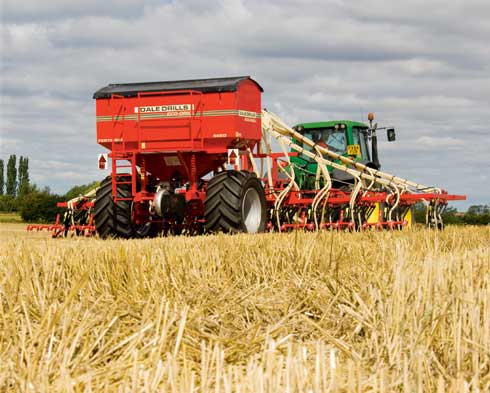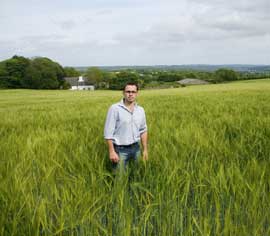Change your mindset to embrace direct drilling

Getting started with direct drilling can be daunting. Experienced direct drill proponent Will Scale answers some commonly asked questions
I want to start direct drilling, but I’m worried about being swamped by grassweeds without ploughing. How do you manage them?
You need to look at grassweeds strategically. They don’t all germinate and prosper in the same way. The main thing is to try to keep them on the surface and deal with them and their offspring on top of the soil, rather than tilling them under for another day. Evidence is mounting that blackgrass control is better if left on the surface, although brome with a weaker herbicide armoury and later germinating characteristics can be challenging.
How do you manage slugs in direct drilling?
 You have to be multi-faceted in your approach. Can you bale straw? Can you cut a bit higher? Can you adopt your rotation? Straw rakes and cambridge rolls can help as well. In a well-consolidated no-till soil, slugs generally find it harder to move around and there are certainly less clods for them, so it is possible to deal with them, as well as complementing with pellets.
You have to be multi-faceted in your approach. Can you bale straw? Can you cut a bit higher? Can you adopt your rotation? Straw rakes and cambridge rolls can help as well. In a well-consolidated no-till soil, slugs generally find it harder to move around and there are certainly less clods for them, so it is possible to deal with them, as well as complementing with pellets.
How do you deal with the ruts in direct drilling? I’m going to have to get the plough out after this wet autumn.
Long-term direct drill land should have the soil structure to be able to deal with a lot of situations. Obviously combines on tracks, controlled traffic farming and lighter equipment all have their place too.
If you have to plough, plough. But ploughing will not make the situation any better for next year, so try to plan your way out of creating the situation – ruts are less common in permanent grassland for a reason and this is the environment and soil structure that direct drilling tries to emulate for annual cropping.
How do you deal with compaction?
The less you can traffic, the less your can break your soil fissures. The less cold hard steel you can put in the interface of the soil, the better chance you will have of reducing compaction. Personally I think a lot of compaction is overrated – and remember the difference between compaction and consolidation.
What about take-all and other fungal diseases?
Tillage eliminates these. The key thing to remember with direct drill/no-till is that rotation needs to take the place of tillage. So you will need to adapt your mindset. That’s not to say things like second wheat are impossible, they are possible, but you will need to learn to think a bit differently and become a better planner.
We are losing a lot of active herbicides now, how do you plan to manage without them?
It is a concern, but it seems unlikely that the situation will be any worse in direct drilling than in any other system. In fact, some of the older banned chemistry really deserve a rethink on use for direct drilling scenarios.
Are there any environmental benefits to direct drilling?
Yes. Less soil erosion for a start, less carbon dioxide emissions, less fuel use and less herbicide use with quality direct drilling (but more herbicide with poor-quality direct drilling). A direct drilled crop is like a winter stubble for wildlife.
How do you adopt direct drilling if you have root crops, maize or sugar beet in the rotation?
Maize is technically a good crop to direct drill – or at least strip-till. Tradition and a lack of research support probably stalled the development in this area. Possibly it’s the same for sugar beet, although this is less proven. For potatoes the options are more limited, possibly reducing deep tillage to the times potatoes are grown is the best solution.
What has been your biggest mistake in direct drilling?
Oh there have been a few – it’s only natural if you are trying to do things for the first time. But usually it is machinery-based – machinery must be kept tip top. It is replacing the job of three or four tillage tools, so it must be up to the job.
What has been your greatest success in direct drilling?
I think the ability to grow very cheap crops comes to the fore after a few years of direct drilling. It takes less time, less horsepower and can allow costs/t to tumble while providing ecological benefits.
How can I learn more about direct drilling?
Register with the No-Till Alliance – we are relaunching our website soon and will have a few open afternoons this November .
Will Scale farms 132ha at Great Nash Farm in Pembrokeshire.

